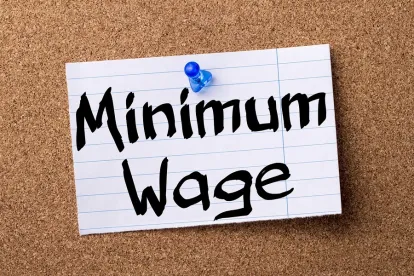The Fair Labor Standards Act (“FLSA”) provides that employers ordinarily must pay their non-exempt employees at least the federal minimum hourly wage of $7.25. However, employers may pay “tipped employees” as little as $2.13 per hour if they regularly earn more than $30 per month in tips, and then make up the difference between the tipped employee’s lower hourly rate and the federal minimum wage via a “tip credit” made up of the tips earned by their tipped employees. (Note that applicable state laws may require a higher hourly rate, even when applying the tip credit.)
The Department of Labor (“DOL”), charged with enforcing the FLSA, has issued interpretative regulations regarding the “tip credit.” Employees who perform more than one job for a single employer, where one or more of the jobs does not regularly result in the payment of tips to the employees, are referred to as holding “dual jobs.” The FLSA regulations prohibit employers from using the tip credit to reduce such an employee’s hourly rate below the statutory minimum wage when they are performing non-tipped jobs. By way of example, the regulation provides that a hotel employee who works as both a restaurant server and maintenance person, and who meets the minimum $30 per month tip requirement when working in the restaurant, may not be paid the lower “tipped employee” hourly rate when performing the maintenance job, which is not a tip-earning position. By contrast, the regulation suggests a server who occasionally performs side duties during their worktime as a server, such as cleaning tables or filling salt dispensers, is not employed in “dual jobs,” because the side duties are related to the tip-originating job duties.
In a recent consolidated case, Marsh v. J. Alexander’s, brought by a group of former servers and bartenders against several former employer restaurants, the plaintiffs argued they worked “dual jobs” and were not paid the full minimum wage when performing non-tipped job duties, such as cleaning bathrooms or soda dispensers. In support of this argument, plaintiffs relied upon the DOL’s Field Operation Handbook (“FOH”), which states that employees who spend 20% or more of their time performing duties that are not specifically designed to originate tips are performing “dual jobs,” and must be paid the full minimum wage when performing such duties. The FOH does not have the effect of law or regulation, but courts often rely upon guidance issued by an agency charged with enforcing a law when that law is found to be ambiguous.
In Marsh, however, the Ninth Circuit found that it was not required to defer to the FOH interpretation of “dual jobs” because the interpretation was inconsistent with the regulation, which was clear on its face. The Ninth Circuit reasoned that the regulation refers to situations in which employees perform completely separate jobs, while the FOH would require employers to parse job duties performed by an employee while acting in a single job and pay them differently depending on which duties they perform during their shifts. The Ninth Circuit found this to be an unwieldy, impractical approach unintended by the “dual jobs” regulation. Accordingly, the Ninth Circuit held that the FOH was essentially an improper, backdoor attempt to make a new “de facto regulation” without going through the proper channels that include notice and public comment. The Ninth Circuit acknowledged it created a split among the circuits with this decision; previously, the Eighth Circuit Court of Appeals considered the same issue but found the FOH was entitled to deference because the “dual jobs” regulation was ambiguous. The Ninth Circuit remanded the consolidated cases back to the trial court to allow plaintiffs to amend their complaint in light of the Ninth Circuit’s opinion.
For now, employers in the Ninth Circuit (Alaska, Arizona, California, Hawaii, Idaho, Montana, Nevada, Oregon, Washington, Guam, N. Mariana Islands) can comfortably rely on the definition of “dual jobs” set forth in the FLSA regulations and not the more restrictive FOH definition, and continue to apply a tip credit to tipped employees who occasionally perform non-tipped duties.




 />i
/>i

